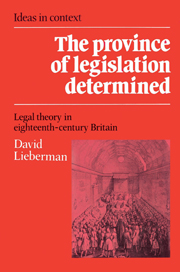2 - Blackstone's science of legislation
Published online by Cambridge University Press: 10 October 2009
Summary
Few features of the Commentaries have suffered such unfortunate neglect as Blackstone's stated aim that his work should furnish guidance to “such as are, or may hereafter become, legislators.” Legislative instruction figured as a major programmatic objective for Blackstone's celebrated law book, and his concerns in this area illuminate some of the most distinctive elements of his novel career in legal science and legal education.
Parliamentary legislation was first mentioned on page ten of volume one of the Commentaries, and the judgment there presented initiated a theme sustained and embellished over four large volumes:
The mischiefs that have arisen to the public from the inconsiderate alterations in our laws are too obvious to be called in question … For, to say the truth, almost all the perplexed questions, almost all the niceties, intricacies, and delays (which have sometimes disgraced the English, as well as other courts of justice) owe their original not to the common law itself, but to innovations that have been made in it by acts of parliament.
The mischiefs of statute received ample illustration at Blackstone's hands. The Hanoverian Mutiny Act, for example, which failed fully to specify the crimes and punishments it authorized stood accused of compromising the fundamental genius of the legal system. Among “the greatest advantages of our English law,” Blackstone observed, was that “not only the crimes themselves which it punishes, but also the penalties which it inflicts, are ascertained and notorious.”
- Type
- Chapter
- Information
- The Province of Legislation DeterminedLegal Theory in Eighteenth-Century Britain, pp. 56 - 68Publisher: Cambridge University PressPrint publication year: 1989

